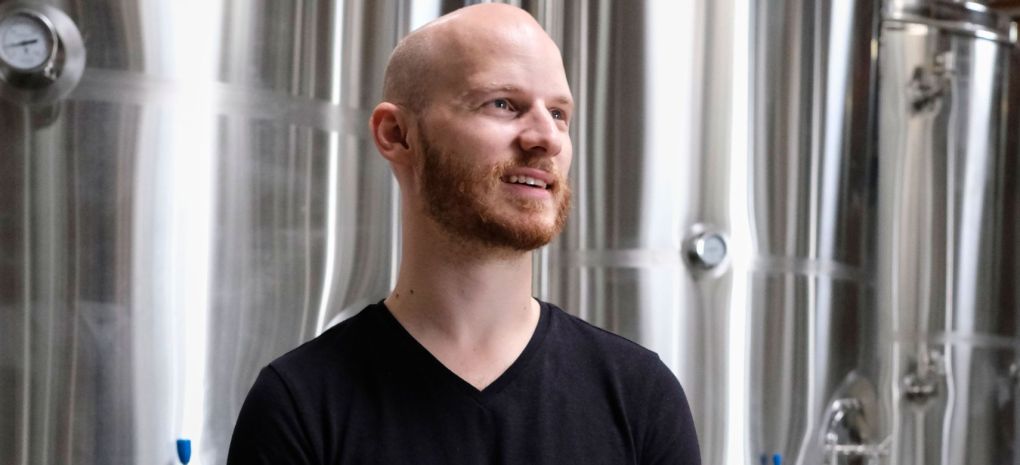
25/10/2023 Crafting Authenticity: Bill Auxier's Journey in Distilling
Meet Bill Auxier, the driving force behind Surf City Still Works. With a background in Chemical Engineering and a passion for fermentation science, Bill embodies the essence of craft distillation. In this interview, he shares insights into his role, the skills crucial for distillers, and the challenges of the industry. Discover the art and authenticity behind Surf City Still Works through Bill's perspective.
Tell us a little about your background and journey into distilling.
I went to school for Chemical Engineering and began brewing beer while still in college. I got hooked on fermentation science and while looking for a job in the beer world out of college I got connected with a small brand that was starting a distillery. I've been in the spirits world ever since!
Your current role and what does your day look like?
I'm currently the General Manager at Surf City Still Works - it's been a bit of a catch-everything role as we've wrapped the final bits of construction to get our tasting room open. With that out of the way, my day ranges from everything between the exciting things of distilling, blending, bottling, and production R&D to the more mundane of inventory tracking, taxes, cleaning, purchase orders & forecasting, and everything else in between.
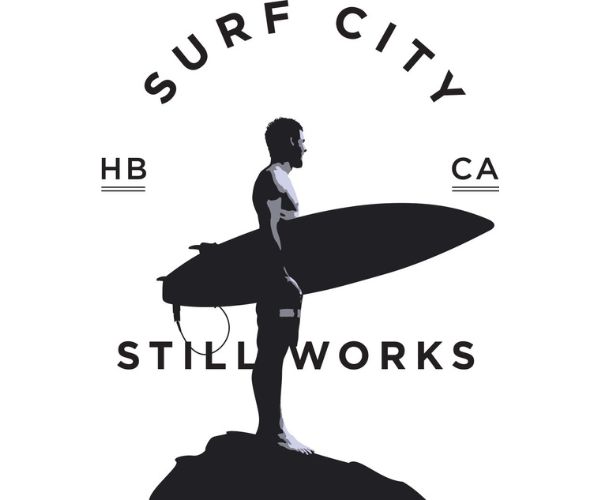
Image: Logo - Surf City Still Works.
What inspired you to become a distiller?
I really enjoyed fermentation science and distilling became the role I could fit into using both the things I enjoyed: cooking, fermentation, and flavor experimentation, along with what I learned in school: distillation, biological reactor science, separation processes and more!
What are some of the most important skills for a distiller?
I think precision is quite key. Paying attention to the details is certainly necessary in this industry to make sure the batch quality stays what the customer expects. On a smaller scale, the other most important skill is probably flexibility and being able to put on multiple hats.
How do you think a distiller can help in driving marketing and sales personally?
I think the best thing a distiller can provide a brand in the marketing and sales side of the business is authenticity. No one knows and understands their product better than the person who develops the recipe and makes it. If the people doing the marketing and sales don't know the correct answers, it can give a bad look to the brand. So while it would be great to have the distiller out there, sometimes the best thing a distiller can do is just ensure that the team is properly trained and capable of informing the customer correctly.
Define a good distiller.
A good distiller has to be someone who pays attention to details. But, they also need to have a bit of charisma and openness to new ideas and flavors to really excel.
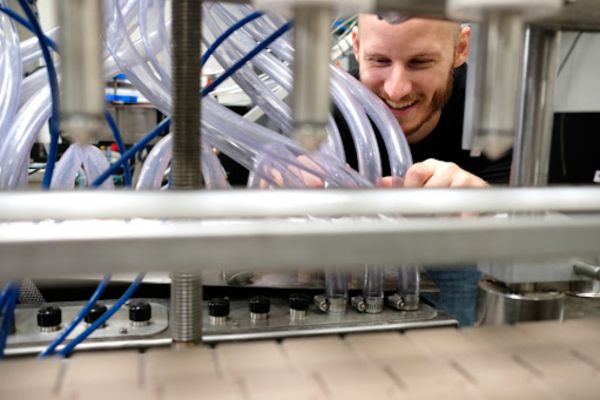
Image: Bill Auxier
What is the hardest part of a distiller's job?
I think it's when a mistake happens, particularly product loss due to a preventable mistake such as not closing a valve on a tank or having a hose break. It's particularly worse if it's a sweetened product and you have to rectify the situation while being sticky!
What's your elevator pitch to a bartender when pitching your brand?
We always take the local and small approach along with our authenticity and aggressive pricing. We want to be part of the community and want our purchases and those pouring our products to feel that.
What are the current challenges the spirits industry is facing according to you?
The largest challenge at the moment is the fight over Direct-to-consumer sales. It's something the wine industry has had for decades which resulted in a huge boom of small wineries. The spirit industry experienced some relief and allowance for it during Covid but it has been getting a lot of pushback on the distributor side. It's something that can help all of the little producers reach their customers. It also creates more equal access to products for the consumer.
What skill or topic you are learning currently and why?
Currently, I am studying for my MBA so I can have a deeper understanding of all of the aspects of the business.
What is your idea of a good life?
The basics are really all that's necessary with some level of security: food, shelter, friends, and family. Good cheer always helps!
Which is your go-to drink and what is the perfect setting you enjoy it in?
Anything while sitting outside with friends and food. I think the food and setting often dictate the drink but it's usually either beer, whiskey, or tequila.
Your favorite 2-3 distilling or spirits books?
I actually still rely on knowledge from a brewing book called Designing Great Beers by Ray Daniels. It's a great analytical dive into malt profiles relative to beer styles but a bit of it translates. I also enjoy the Yeast, Water, & Malt books from Brewers Publications. I know they're all beer books but they're great resources.
What do you look for in a supplier when sourcing bulk spirits / NGS if you do?
Consistency and pricing are probably the two largest players after flavor/taste profile. I need to count on the product being the same over time and I also need it to be at a price point that I'm not losing money on it.
Take us through your process of blending.
Blending is always used for a specific improvement of the parts. Usually done to create a better overall flavor and aroma profile of a product. I would say it is definitely as much an art as it is a science to get everything right. There's always a lot of feedback in multiple rounds. The first blending usually has a targeted goal in mind, such as the product lacking aromatics or the flavor being too one-dimensional. I then blend with those in mind, taking a guess at what the proportions should be mostly just based upon initial feelings. That first blend creates the template to work from in a more scientific and stepped way. After feedback from the first blend and hopefully some time in between to try the outcome more than once in different settings, subsequent blending is done in proportion to what was initially tried. From there, the blend is proportionally zeroed in on the desired taste and aroma profile until it satisfies the needs.
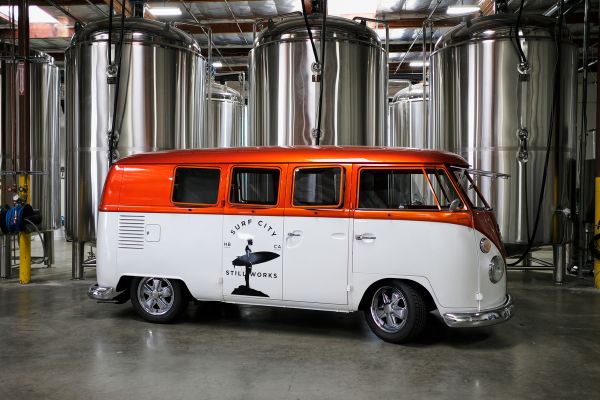
Image: Surf City Still Works - Distilling the Spirit of Huntington Beach
How do you take care of production waste?
We try to work with suppliers to minimize any additional packaging materials we can avoid - such as reducing cardboard in the packaging of bulk or ordering larger supply quantities to minimize product waste.
If you had to give a quick elevator pitch on why an account should bring in your product for its consumers, what would it be?
We have a great, locally-made product that exemplifies the Surf City lifestyle. Our bottles use artwork from local Huntington Beach artists and it's all made at the facility here. We also try to be efficient to keep our price point at an affordable number.
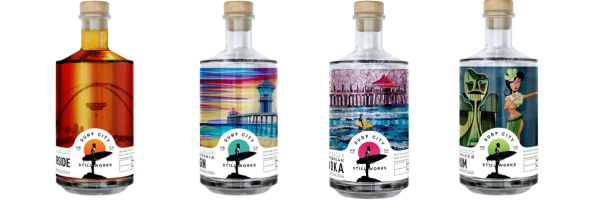
Image: From Left to Right - Pierside Bourbon Whiskey, California Gin, Shorebreak Vodka, and Surfrider Rum.
How do you create complexity in the fermentation stage?
There are a number of things we play with depending on the desired outcome - everything from the grain bill to adjusting pH and temperature of the fermentation along with being selective on our yeast strain. We do a number of different trials with different yeasts before finalizing which strain works the best for a product.
What steps do you take to become more sustainable?
We're always trying to minimize waste and one of the bigger things is minimizing excess water usage. We have closed-loop cooling across heat exchangers to minimize our water usage for distillation. We also run higher abv fermentations to reduce the total amount of water used in fermentation per alcohol output.
How do you explore new markets for your spirits and focus on business development?
Expansion through salespeople is the easiest way, working out radially from the distillery location. It lets us keep a pulse on the consumer by operating in that way.
[[relatedPurchasesItems-31]]
What trends do you anticipate in the beverage industry in the coming months? Where do you see the domestic craft distilling scene going? What's next for the industry?
There's some level of de-premiumization going on at the moment which has been hard on a few of the smaller distilleries. I think we're going through a small period of consolidation as well. I think the industry is going to continue to grow from here as it evolves. People who started a few years ago are honing their craft and some who are even longer in the industry are putting out some really nice aged spirits. The craft distilling industry is hitting a maturity point in terms of product quality while still enjoying the fun and crafty products that consumers look for from a small producer.
Note: Header and Index Image Source - Bill Auxier



